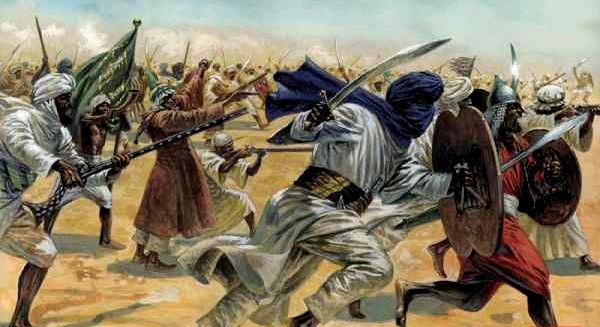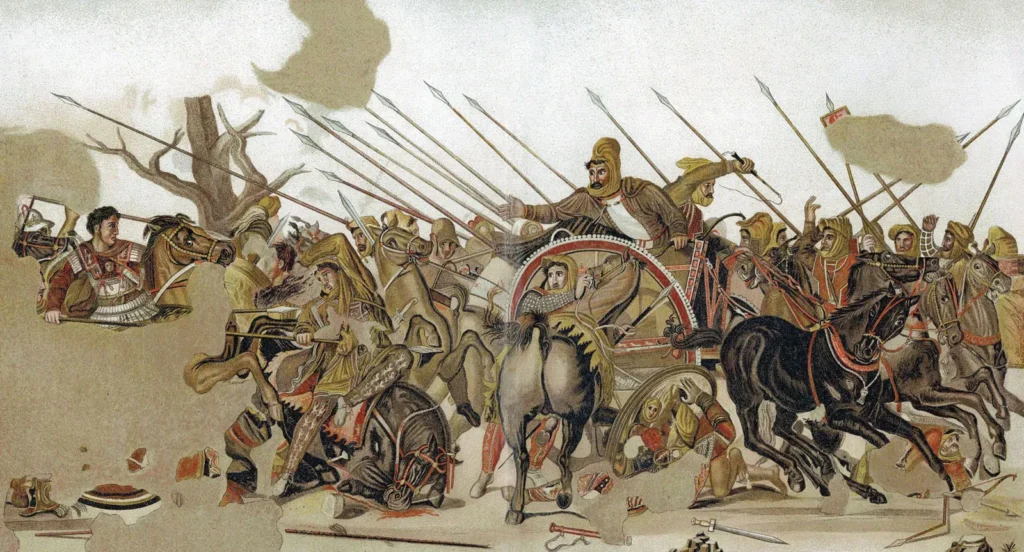The History of conflict
Welcome to a journey through time, where we uncover the fascinating and often tumultuous history of conflict. From ancient civilizations clashing in epic battles to religious differences fueling centuries-long wars, humanity has been grappling with conflict since the dawn of civilization. In this blog post, we will explore the origins of conflict and delve into some notable examples throughout history. So buckle up and prepare for an enthralling exploration as we trace the path of discord that has shaped our world!
History of conflict

Conflict has been an inseparable part of the human experience, dating back to ancient times. In Mesopotamia, one of the earliest known civilizations, conflict arose due to territorial disputes and competition for resources. The city-states of Sumer constantly clashed over fertile land and water rights, resulting in countless battles.
Moving on to Egypt, a land steeped in mysticism and grandeur, conflicts often erupted as pharaohs sought to expand their territories or assert dominance over neighboring kingdoms. These clashes were not only driven by power but also influenced by religious beliefs. The Egyptians believed that their pharaohs were divine rulers with a duty to protect their people’s interests at any cost.
In Greece, conflict took on a different form – it became intertwined with concepts such as honor and glory. The ancient Greeks engaged in numerous wars among themselves for supremacy and control over valuable trade routes. From the Persian Wars to the Peloponnesian War between Athens and Sparta, these conflicts shaped Greek history and left an indelible mark on Western civilization.
Religion has played a significant role in fueling conflicts throughout history. Whether it was the Crusades fought between Christians and Muslims during medieval times or the Protestant Reformation leading to bloody wars across Europe centuries later, religious differences have often been at the heart of violent confrontations.
The Middle Ages witnessed some of the bloodiest conflicts in history. The Crusades saw Christian armies embark on holy wars against Muslim forces in an attempt to reclaim Jerusalem from Islamic rule. Meanwhile, Genghis Khan’s Mongol invasions swept through Asia with unparalleled brutality as they established one of history’s largest empires through conquest.
The Hundred Years’ War between England and France marked another notable chapter in this tumultuous period. Spanning more than a century (1337-1453), this protracted conflict was fueled by territorial ambitions and dynastic rivalries between two powerful European nations.
As we can see, conflict has been an ever-present force shaping the course of human history
Introduction to Conflict
Conflict is a part of human nature. It has been present throughout history, shaping the course of civilizations and leaving lasting impacts on societies. From ancient times to modern days, conflicts have arisen for various reasons, from territorial disputes to ideological differences.
At its core, conflict refers to a clash or disagreement between individuals, groups, or nations that arises due to opposing interests or beliefs. It can manifest in different forms – verbal arguments, physical confrontations, or even large-scale wars.
In many cases, conflicts arise when there is a scarcity of resources such as land or water. Competition for these valuable assets often leads to tensions and eventual clashes between rival factions. Additionally, conflicts can also emerge from cultural differences and power struggles within societies.
Throughout history, conflicts have shaped the rise and fall of empires and kingdoms. They have influenced political systems and social structures while leaving behind legacies that are still felt today.
Understanding the history of conflict allows us to gain insights into why certain events unfolded as they did. By studying past conflicts and their outcomes, we can learn valuable lessons about diplomacy, negotiation strategies,and peaceful resolution methods.
As we delve deeper into the fascinating world of conflict throughout history in this blog series,dive deep into specific examples from ancient times like Mesopotamia,Egypt,and Greece.
We will explore how religion played a central role in fueling some of the most significant conflicts in recorded history.
And not forgetting,the Middle Ages with its memorable wars including crusades,Mongol invasions,and Hundred Years’ War.
Stay tuned for captivating stories from our turbulent past!
Conflict in Ancient Times: Examples from Mesopotamia, Egypt, and Greece

Ancient civilizations were no strangers to conflict. In fact, it was often a way of life for these early societies. Let’s take a closer look at some examples of conflict that occurred in the ancient world, specifically in Mesopotamia, Egypt, and Greece.
In Mesopotamia, one of the earliest recorded instances of conflict can be found in the Epic of Gilgamesh. This epic poem tells the tale of a king who seeks immortality but is ultimately faced with his own mortality. Throughout the story, there are battles and conflicts between gods and humans alike.
Moving on to Egypt, we find evidence of conflicts during different periods throughout its history. One notable example is the Battle of Kadesh between Ramses II and the Hittite Empire. This battle took place around 1274 BC and was fought over control of territory in modern-day Syria.
Greece also had its fair share of conflict throughout its ancient history. The most well-known example is perhaps the Trojan War as depicted by Homer in his epic poem The Iliad. This war was fought between Greeks and Trojans over Helen – said to be “the face that launched a thousand ships.”
These examples just scratch the surface when it comes to conflict in ancient times. From territorial disputes to power struggles among gods and mortals alike, conflict shaped much of human history even thousands of years ago.
The Role of Religion in Conflict throughout History
Throughout history, religion has played a significant role in fueling conflicts and wars. From ancient civilizations to modern times, religious differences have often been at the heart of violent disputes.
In ancient Mesopotamia, for example, the rivalry between city-states such as Babylon and Assyria was exacerbated by differing religious beliefs. The same can be said for ancient Egypt, where clashes arose between followers of different gods and goddesses.
Moving forward to classical Greece, religious tensions were evident during the Peloponnesian War between Athens and Sparta. While the conflict had political roots, it also had underlying religious motivations as both city-states sought dominance over their respective pantheons.
Fast-forwarding to medieval times brings us to the Crusades – a series of holy wars fought between Christians and Muslims over control of Jerusalem. These conflicts were driven by religious fervor on both sides as each believed they were fighting for their faith.
The Mongol invasions are another prime example of how religion fueled conflict. As Genghis Khan expanded his empire across Asia, he encountered various religions that did not align with his own beliefs. This led to brutal campaigns against those who resisted conversion or refused to submit.
We cannot overlook the Hundred Years’ War between England and France which had both political and religious dimensions. The war saw alliances forming based on shared faith – with England siding more closely with Protestantism while France remained staunchly Catholic.
Religion’s impact on conflicts throughout history cannot be ignored or minimized. It has caused divisions among nations and peoples, leading to violence and bloodshed in its wake. Understanding this historical context helps shed light on current global issues where religion continues to play a central role in many ongoing conflicts today
Wars and Conflicts of the Middle Ages: Crusades, Mongol Invasions, and Hundred Years’ War
The wars and conflicts of the Middle Ages were marked by intense rivalries, power struggles, and religious tensions. The Crusades saw Christian knights from Europe embark on a series of military campaigns to reclaim Jerusalem from Muslim control. These holy wars resulted in significant loss of life and left a lasting impact on both Christianity and Islam.
Another major conflict during this period was the Mongol invasions. Led by Genghis Khan and his successors, the Mongols swept across Asia, leaving destruction in their wake. Their conquests not only reshaped political boundaries but also led to cultural exchanges between East and West.
The Hundred Years’ War between England and France engulfed much of Western Europe for over a century. This protracted conflict was driven by territorial disputes, dynastic claims to thrones, economic factors, and nationalistic sentiments. It witnessed famous battles like Agincourt and Joan of Arc’s pivotal role in French resistance.
These examples highlight how conflicts have shaped human history throughout time. From ancient civilizations like Mesopotamia and Egypt to medieval Europe, societies have often resorted to war as a means to resolve differences or assert dominance.
As we reflect on the history of conflict, it is crucial to learn from these experiences so that we can strive towards peaceful resolutions in today’s world. Understanding the causes behind past conflicts can help us navigate contemporary challenges with empathy, diplomacy, and an unwavering commitment to dialogue.
Let us remember that while conflict has been an undeniable part of our collective story as humans; it does not define who we are or what we can achieve together. By valuing peace over violence and cooperation over confrontation; we have the potential to create a future where harmony prevails over hostility – shaping a more prosperous world for generations yet unborn.
Share this post:

